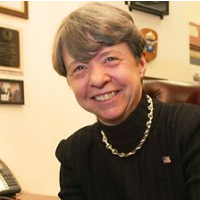SEC Revolving Door Bumped 2 of 5 Commissioners and Third Exec Off of JPMorgan Case
 Mary Jo White (photo: Linda Rosier, NY Daily News)
Mary Jo White (photo: Linda Rosier, NY Daily News)
The notorious “revolving door”—through which individuals slip back-and-forth between powerful companies and the government agencies that regulate them—has never been as apparent as it was in the recently settled case between the Securities and Exchange Commission (SEC) and JPMorgan Chase & Company.
Three top SEC executives—including two of its five commissioners—had to recuse themselves from the case because they each had previously performed work for firms representing the bank. Fortunately for the SEC, the remaining three commissioners barely constituted the majority required to resolve the case.
At issue was the so-called London “whale” case, in which traders overvalued a complex portfolio to hide massive losses from the firm’s board. The SEC settled with JPMorgan, which agreed to pay a $200 million penalty, and publicly acknowledged that it violated federal securities laws. But the deal had to be approved by the SEC’s five-member board of commissioners, and that was not easy.
For starters, SEC Chair Mary Jo White had to recuse herself from the case because she had previously worked for Debevoise & Plimpton LLC, which had performed services for JPMorgan.
Likewise, Republican Commissioner Daniel Gallagher had to beg off from being involved in the settlement because his former employer, Wilmer Cutler Pickering Hale and Dorr LLP, had done work for the bank.
Also, the agency’s co-director of enforcement, Andrew Ceresney, had to recuse himself because of his work at Debevoise. Ceresney had conducted the investigation that led to the settlement.
With White and Gallagher out, that left only three commissioners to form a quorum, the bare minimum allowed under SEC rules. Two of the three present approved the agreement, which was enough to finalize the case.
Legal observers have pointed out that settlements approved by such a small margin could damage the chances for the SEC to win future cases. The SEC insists that recusals will not occur often, and agency chief White made assurances during her March confirmation hearing that the amount of cases from which she would have to recuse herself would be “quite narrow.”
More than 400 ex-SEC staffers were working for Wall Street between 2001-2010, according to a report released this year by the Project On Government Oversight. As the revolving door keeps turning, there may be plenty of opportunity for them to swing back to their old job with a good chance for many more recusals.
-Danny Biederman, Noel Brinkerhoff
To Learn More:
Washington’s Revolving Door Catches SEC (by Deborah Solomon, Wall Street Journal)
Tangle of Ties Binds SEC's Top Ranks (by Jean Eaglesham and Jessica Holzer, Wall Street Journal)
JPMorgan Chase Agrees to Pay $200 Million and Admits Wrongdoing to Settle SEC Charges (U.S. Securities and Exchange Commission)
JPMorgan to Pay $410 Million in Enron-Like Scheme, but Admits Nothing while Execs Go Free (by Ken Broder, AllGov)
Another Banking Regulator Goes through the Golden Revolving Door (by Noel Brinkerhoff, AllGov)
Revolving Door at SEC is in a Whirl as Hundreds Hired by Industry they Regulated (by Noel Brinkerhoff and Danny Biederman, AllGov)
- Top Stories
- Unusual News
- Where is the Money Going?
- Controversies
- U.S. and the World
- Appointments and Resignations
- Latest News
- Trump to Stop Deportations If…
- Trump Denounces World Series
- What If China Invaded the United States?
- Donald Trump Has a Mental Health Problem and It Has a Name
- Trump Goes on Renaming Frenzy






Comments